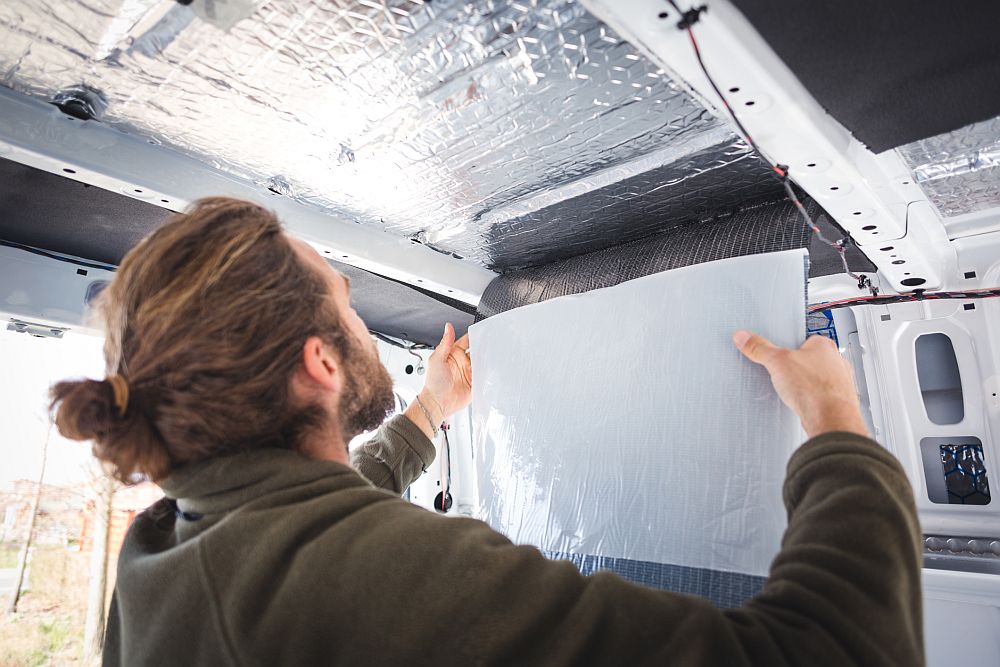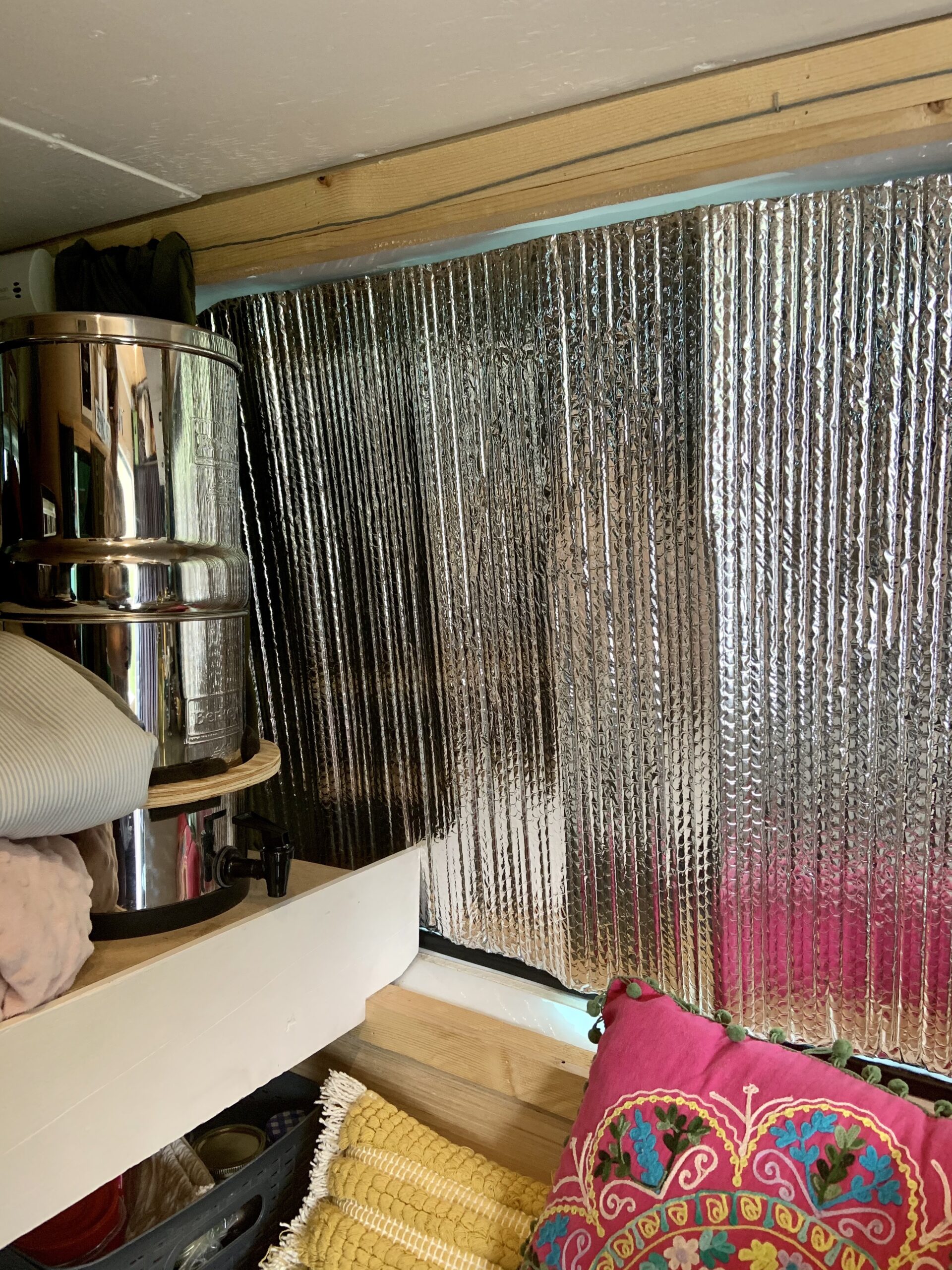How to Deal With Condensation in a Van
Living in a van is 90% incredible. The other 10% of it is a little more complicated than that. This, I know from 3 years of first-hand experience.
One thing that gets overlooked quite often when building and living in a van is the dreaded topic of condensation.

When I first started planning my build, it wasn’t really something that I took into consideration. Perhaps it was my naivety or the fact that as the community grows, so do the resources available. However, my first winter spent in the van gave me quite the wake-up call as little pebbles of water formed on all my windows and left me clueless about how to deal with it.
What is condensation?
Simply put, condensation is water that collects into droplets on a cold surface when mixed with humid (moist) air.
In other words, at night, when you’re sleeping in your warm van, water droplets collect on the windows and any other surface that is colder than the air inside your van.

Why Avoid Condensation Build-up
-
Mold
Ever came across the dangers of having mold in your home? Let’s just say, it’s not pleasant! Constant coughing, sore throat, eye irritation, and decreased immune function are just some of the reasons why doing everything in your power to avoid a mold outbreak in your home is VERY important.
-
Rust
Another thing that condensation can cause is rust. How? Well, mix water with a piece of exposed metal and you’ve got a chance that rust will (eventually) form. Mix that with salt from the winter roads and you’ve got every vanlifers nightmare.
While it may be nearly impossible to avoid the fact that rust eventually forms on most (if not all) vehicles. It’s up to you to do your best to lessen that timeframe and increase the longevity of your home.
-
Rot
One more thing that condensation can do to your build is cause rot. If you have enough condensation build-up, eventually, the susceptible parts of your build will begin to rot. Think, cabinets, ceiling boards or, anything wood related. Rot itself will eventually lead to both rust and mold. Something I don’t think anyone would dream of.
How Does Condensation Form
Condensation forms from moisture in the air. It then latches onto a surface that is colder than the air itself. This is why you see it on windows mainly, but sometimes the inner roof, and anywhere else that has not been properly insulated.
Where does this moisture come from?
Most commonly, your breath! As you’re spending time in your van, the air that your breath releases, is most likely going to be warmer than the air inside your home. Have 2 people and a dog living in a van? That increases it exponentially!
Alternatively, it also comes from cooking without proper ventilation. If you’re boiling water, steaming veggies or frying up something delicious, all of that moisture is being put into the air as well.
Another place condensation comes from is the source of heating you have. Some are better than others. For example, propane notoriously creates more moisture than other alternatives. A diesel heater is typically referred to as dry heat and releases 2x less moisture than a propane heater would.
How to stop condensation in my van?

1. Install a Ventilation Fan
The first, and most important thing you can do to prevent condensation build-up is, installing a fan (or two!).
Now, I’m not talking about a standing fan that you’d normally see in every cubicle of a sweaty office building. Nope, this fan is a roof vent/fan that runs off of 12-volt power and has the ability to either suck air INTO or OUT of your van.
Usually, you see one fan in the kitchen area and another above the bed. Doing so, allows for a nice cross-breeze to be created, while also keeping condensation to a minimum. There are two main options when choosing what brand of fan to install. Maxxfan and Fantastic fan. This choice greatly depends on your budget.
2. Insulate, Insulate, Insulate!
I know there is a minor debate that goes on within the vanlife community on whether insulation is worth it or not. However, I am here to tell you, insulate your van!
Even if you only plan to be in warm climates all the time, you may be surprised by how cold it can be waking up in an uninsulated metal box on wheels. Not only is it cold, but all the air your body produced overnight will have formed into water droplets inside your home.
Here’s the thing though, insulation is only helpful if it’s right against the metal.
This can sometimes be hard to do with rigid boards or other similar insulations. Personally, I had my van professionally spray foamed as it seemed like the best option for the cold Canadian winters. Other options might be Roxull Batt insulation, Sheeps Wool, Hemp, Fiberglass, the list goes on!
3. Add an externally ventilated Heater
Having a heater in your van is, in my opinion, one of the most important aspects of any build. Take it from me, I’ve lived in my van without a heater and it is one of the most miserable experiences I’ve ever gone through.
So, not only does having a heater keep you warm but, it also helps to dry up some of that excess moisture that lives in your van with you.
It is important to add that when I mention heaters, I am not referring to the Mr. Buddy propane heater that is too often seen. Those exhaust into the living space, creating quite a carbon monoxide hazard, and also creating a moist form of heat. Sure, those heaters are fine for *very* short time periods but long-term usage is not ideal nor is it safe.
There are a variety of options for which heater to buy. Prices can range from $150 – $1000+ and I must say, in the case of heaters, you get what you pay for. Sure, you can purchase a cheap diesel heater off of Amazon and have warmth for a while, but keep in mind those heaters are not made to last long term and will most likely need to be purchased again.
Personally, I have an Espar D2L and love it! The heat is very dry and does exactly what I ask of it. Many people swear by their externally vented propane furnace, which is another great option. However, keep in mind, they do produce moist heat in comparison to what a diesel or gas heater creates.
4. Window Ventilation
When designing your van, it wouldn’t hurt to also add windows that are capable of opening. This helps to create a nice cross-breeze that only benefits you when dealing with condensation.
One of the most popular brands that make windows like this is C.R Laurence, they are perfect for letting fresh air into your home.
If installing opening windows isn’t an option, the next best choice is simply cracking your driver’s and passengers’ windows when possible.
5. Window Covers

Having custom window covers that fit over all the windows in your van is crucial to reducing your condensation build-up. You can either buy them professionally made or, make them yourself.
Most of the DIY window covers and professionally made ones that you see have some refletix in them.
This helps to keep warm air OUT in the summer and the heat IN during winter. Personally, I just cut some refletix to the size of my windows and put them in behind the curtains at night.
6. Airflow
This step is an ongoing responsibility. As a van dweller, it is your job to make sure your home on wheels is a condensation-free place. That requires consistent attention to the small things like being aware of airflow. This means, opening the door when possible, cracking the window or turning on the fan(s). All things that you would need to do in a regular house, just differently when living in a van!
How to clean up the condensation?
So, you wake up in the morning and the windows are covered by the annoying condensation you’ve worked so hard to avoid. What do you do?
No matter how tempted you are to roll over and go back to sleep, don’t! Instead, grab a very absorbent cloth or paper towel and wipe up the water to the best of your ability. It can be easy to miss a day and suddenly a month has gone by and your van is smelling a little funky.
Another option for cleaning up is a wet vac. Personally, I don’t have one (yet!), but I have a couple of friends who find it helps cut down on paper towel waste and makes the process much easier.
Other helpful articles
- Van Insulation Tips For Your Camper Conversion
- 10 Best Camper Van Windows For Customising Your New Travelling Home
- 5 Best Camper Van Roof Vents For Your Conversion




COMMENTS
Please note that all comments will be checked by our team before being approved.